- Home
- E. M. Forster
Where Angels Fear to Tread
Where Angels Fear to Tread Read online
Produced by Richard Fane
WHERE ANGELS FEAR TO TREAD
By E. M. Forster
Chapter 1
They were all at Charing Cross to see Lilia off--Philip, Harriet, Irma,Mrs. Herriton herself. Even Mrs. Theobald, squired by Mr. Kingcroft,had braved the journey from Yorkshire to bid her only daughter good-bye.Miss Abbott was likewise attended by numerous relatives, and the sightof so many people talking at once and saying such different thingscaused Lilia to break into ungovernable peals of laughter.
"Quite an ovation," she cried, sprawling out of her first-classcarriage. "They'll take us for royalty. Oh, Mr. Kingcroft, get usfoot-warmers."
The good-natured young man hurried away, and Philip, taking his place,flooded her with a final stream of advice and injunctions--where tostop, how to learn Italian, when to use mosquito-nets, what picturesto look at. "Remember," he concluded, "that it is only by going off thetrack that you get to know the country. See the little towns--Gubbio,Pienza, Cortona, San Gemignano, Monteriano. And don't, let me begyou, go with that awful tourist idea that Italy's only a museum ofantiquities and art. Love and understand the Italians, for the peopleare more marvellous than the land."
"How I wish you were coming, Philip," she said, flattered at theunwonted notice her brother-in-law was giving her.
"I wish I were." He could have managed it without great difficulty,for his career at the Bar was not so intense as to prevent occasionalholidays. But his family disliked his continual visits to the Continent,and he himself often found pleasure in the idea that he was too busy toleave town.
"Good-bye, dear every one. What a whirl!" She caught sight of her littledaughter Irma, and felt that a touch of maternal solemnity was required."Good-bye, darling. Mind you're always good, and do what Granny tellsyou."
She referred not to her own mother, but to her mother-in-law, Mrs.Herriton, who hated the title of Granny.
Irma lifted a serious face to be kissed, and said cautiously, "I'll domy best."
"She is sure to be good," said Mrs. Herriton, who was standing pensivelya little out of the hubbub. But Lilia was already calling to MissAbbott, a tall, grave, rather nice-looking young lady who was conductingher adieus in a more decorous manner on the platform.
"Caroline, my Caroline! Jump in, or your chaperon will go off withoutyou."
And Philip, whom the idea of Italy always intoxicated, had startedagain, telling her of the supreme moments of her coming journey--theCampanile of Airolo, which would burst on her when she emerged from theSt. Gothard tunnel, presaging the future; the view of the Ticino andLago Maggiore as the train climbed the slopes of Monte Cenere; the viewof Lugano, the view of Como--Italy gathering thick around her now--thearrival at her first resting-place, when, after long driving throughdark and dirty streets, she should at last behold, amid the roar oftrams and the glare of arc lamps, the buttresses of the cathedral ofMilan.
"Handkerchiefs and collars," screamed Harriet, "in my inlaid box! I'velent you my inlaid box."
"Good old Harry!" She kissed every one again, and there was a moment'ssilence. They all smiled steadily, excepting Philip, who was choking inthe fog, and old Mrs. Theobald, who had begun to cry. Miss Abbott gotinto the carriage. The guard himself shut the door, and told Lilia thatshe would be all right. Then the train moved, and they all moved with ita couple of steps, and waved their handkerchiefs, and uttered cheerfullittle cries. At that moment Mr. Kingcroft reappeared, carrying afootwarmer by both ends, as if it was a tea-tray. He was sorry thathe was too late, and called out in a quivering voice, "Good-bye, Mrs.Charles. May you enjoy yourself, and may God bless you."
Lilia smiled and nodded, and then the absurd position of the foot-warmerovercame her, and she began to laugh again.
"Oh, I am so sorry," she cried back, "but you do look so funny. Oh, youall look so funny waving! Oh, pray!" And laughing helplessly, she wascarried out into the fog.
"High spirits to begin so long a journey," said Mrs. Theobald, dabbingher eyes.
Mr. Kingcroft solemnly moved his head in token of agreement. "I wish,"said he, "that Mrs. Charles had gotten the footwarmer. These Londonporters won't take heed to a country chap."
"But you did your best," said Mrs. Herriton. "And I think it simplynoble of you to have brought Mrs. Theobald all the way here on such aday as this." Then, rather hastily, she shook hands, and left him totake Mrs. Theobald all the way back.
Sawston, her own home, was within easy reach of London, and they werenot late for tea. Tea was in the dining-room, with an egg for Irma, tokeep up the child's spirits. The house seemed strangely quiet after afortnight's bustle, and their conversation was spasmodic and subdued.They wondered whether the travellers had got to Folkestone, whether itwould be at all rough, and if so what would happen to poor Miss Abbott.
"And, Granny, when will the old ship get to Italy?" asked Irma.
"'Grandmother,' dear; not 'Granny,'" said Mrs. Herriton, giving hera kiss. "And we say 'a boat' or 'a steamer,' not 'a ship.' Ships havesails. And mother won't go all the way by sea. You look at the map ofEurope, and you'll see why. Harriet, take her. Go with Aunt Harriet, andshe'll show you the map."
"Righto!" said the little girl, and dragged the reluctant Harrietinto the library. Mrs. Herriton and her son were left alone. There wasimmediately confidence between them.
"Here beginneth the New Life," said Philip.
"Poor child, how vulgar!" murmured Mrs. Herriton. "It's surprising thatshe isn't worse. But she has got a look of poor Charles about her."
"And--alas, alas!--a look of old Mrs. Theobald. What appallingapparition was that! I did think the lady was bedridden as well asimbecile. Why ever did she come?"
"Mr. Kingcroft made her. I am certain of it. He wanted to see Liliaagain, and this was the only way."
"I hope he is satisfied. I did not think my sister-in-law distinguishedherself in her farewells."
Mrs. Herriton shuddered. "I mind nothing, so long as she has gone--andgone with Miss Abbott. It is mortifying to think that a widow ofthirty-three requires a girl ten years younger to look after her."
"I pity Miss Abbott. Fortunately one admirer is chained to England. Mr.Kingcroft cannot leave the crops or the climate or something. I don'tthink, either, he improved his chances today. He, as well as Lilia, hasthe knack of being absurd in public."
Mrs. Herriton replied, "When a man is neither well bred, nor wellconnected, nor handsome, nor clever, nor rich, even Lilia may discardhim in time."
"No. I believe she would take any one. Right up to the last, when herboxes were packed, she was 'playing' the chinless curate. Both thecurates are chinless, but hers had the dampest hands. I came on them inthe Park. They were speaking of the Pentateuch."
"My dear boy! If possible, she has got worse and worse. It was your ideaof Italian travel that saved us!"
Philip brightened at the little compliment. "The odd part is that shewas quite eager--always asking me for information; and of course I wasvery glad to give it. I admit she is a Philistine, appallingly ignorant,and her taste in art is false. Still, to have any taste at all issomething. And I do believe that Italy really purifies and ennobles allwho visit her. She is the school as well as the playground of the world.It is really to Lilia's credit that she wants to go there."
"She would go anywhere," said his mother, who had heard enough of thepraises of Italy. "I and Caroline Abbott had the greatest difficulty indissuading her from the Riviera."
"No, Mother; no. She was really keen on Italy. This travel is quite acrisis for her." He found the situation full of whimsical romance: therewas something half attractive, half repellent in the thought of thisvulgar woman journeying to places he loved and revered. Why should shenot be transfigur
ed? The same had happened to the Goths.
Mrs. Herriton did not believe in romance nor in transfiguration, nor inparallels from history, nor in anything else that may disturb domesticlife. She adroitly changed the subject before Philip got excited. SoonHarriet returned, having given her lesson in geography. Irma went to bedearly, and was tucked up by her grandmother. Then the two ladies workedand played cards. Philip read a book. And so they all settled down totheir quiet, profitable existence, and continued it without interruptionthrough the winter.
It was now nearly ten years since Charles had fallen in love with LiliaTheobald because she was pretty, and during that time Mrs. Herriton hadhardly known a moment's rest. For six months she schemed to preventthe match, and when it had taken place she turned to another task--thesupervision of her daughter-in-law. Lilia must be pushed through lifewithout bringing discredit on the family into which she had married. Shewas aided by Charles, by her daughter Harriet, and, as soon as he wasold enough, by the clever one of the family, Philip. The birth of Irmamade things still more difficult. But fortunately old Mrs. Theobald, whohad attempted interference, began to break up. It was an effort to herto leave Whitby, and Mrs. Herriton discouraged the effort as far aspossible. That curious duel which is fought over every baby was foughtand decided early. Irma belonged to her father's family, not to hermother's.
Charles died, and the struggle recommenced. Lilia tried to assertherself, and said that she should go to take care of Mrs. Theobald.It required all Mrs. Herriton's kindness to prevent her. A house wasfinally taken for her at Sawston, and there for three years she livedwith Irma, continually subject to the refining influences of her latehusband's family.
During one of her rare Yorkshire visits trouble began again. Liliaconfided to a friend that she liked a Mr. Kingcroft extremely, butthat she was not exactly engaged to him. The news came round to Mrs.Herriton, who at once wrote, begging for information, and pointing outthat Lilia must either be engaged or not, since no intermediate stateexisted. It was a good letter, and flurried Lilia extremely. She leftMr. Kingcroft without even the pressure of a rescue-party. She cried agreat deal on her return to Sawston, and said she was very sorry. Mrs.Herriton took the opportunity of speaking more seriously about theduties of widowhood and motherhood than she had ever done before. Butsomehow things never went easily after. Lilia would not settle down inher place among Sawston matrons. She was a bad housekeeper, always inthe throes of some domestic crisis, which Mrs. Herriton, who kept herservants for years, had to step across and adjust. She let Irma stopaway from school for insufficient reasons, and she allowed her to wearrings. She learnt to bicycle, for the purpose of waking the place up,and coasted down the High Street one Sunday evening, falling off at theturn by the church. If she had not been a relative, it would have beenentertaining. But even Philip, who in theory loved outraging Englishconventions, rose to the occasion, and gave her a talking which sheremembered to her dying day. It was just then, too, that they discoveredthat she still allowed Mr. Kingcroft to write to her "as a gentlemanfriend," and to send presents to Irma.
Philip thought of Italy, and the situation was saved. Caroline,charming, sober, Caroline Abbott, who lived two turnings away, wasseeking a companion for a year's travel. Lilia gave up her house, soldhalf her furniture, left the other half and Irma with Mrs. Herriton, andhad now departed, amid universal approval, for a change of scene.
She wrote to them frequently during the winter--more frequently than shewrote to her mother. Her letters were always prosperous. Florence shefound perfectly sweet, Naples a dream, but very whiffy. In Rome one hadsimply to sit still and feel. Philip, however, declared that she wasimproving. He was particularly gratified when in the early spring shebegan to visit the smaller towns that he had recommended. "In a placelike this," she wrote, "one really does feel in the heart of things, andoff the beaten track. Looking out of a Gothic window every morning, itseems impossible that the middle ages have passed away." The letter wasfrom Monteriano, and concluded with a not unsuccessful description ofthe wonderful little town.
"It is something that she is contented," said Mrs. Herriton. "But no onecould live three months with Caroline Abbott and not be the better forit."
Just then Irma came in from school, and she read her mother's letter toher, carefully correcting any grammatical errors, for she was a loyalsupporter of parental authority--Irma listened politely, but soonchanged the subject to hockey, in which her whole being was absorbed.They were to vote for colours that afternoon--yellow and white or yellowand green. What did her grandmother think?
Of course Mrs. Herriton had an opinion, which she sedately expounded, inspite of Harriet, who said that colours were unnecessary for children,and of Philip, who said that they were ugly. She was getting proud ofIrma, who had certainly greatly improved, and could no longer be calledthat most appalling of things--a vulgar child. She was anxious to formher before her mother returned. So she had no objection to the leisurelymovements of the travellers, and even suggested that they shouldoverstay their year if it suited them.
Lilia's next letter was also from Monteriano, and Philip grew quiteenthusiastic.
"They've stopped there over a week!" he cried. "Why! I shouldn't havedone as much myself. They must be really keen, for the hotel's none toocomfortable."
"I cannot understand people," said Harriet. "What can they be doing allday? And there is no church there, I suppose."
"There is Santa Deodata, one of the most beautiful churches in Italy."
"Of course I mean an English church," said Harriet stiffly. "Liliapromised me that she would always be in a large town on Sundays."
"If she goes to a service at Santa Deodata's, she will find more beautyand sincerity than there is in all the Back Kitchens of Europe."
The Back Kitchen was his nickname for St. James's, a small depressingedifice much patronized by his sister. She always resented any slight onit, and Mrs. Herriton had to intervene.
"Now, dears, don't. Listen to Lilia's letter. 'We love this place, andI do not know how I shall ever thank Philip for telling me it. It isnot only so quaint, but one sees the Italians unspoiled in all theirsimplicity and charm here. The frescoes are wonderful. Caroline, whogrows sweeter every day, is very busy sketching.'"
"Every one to his taste!" said Harriet, who always delivered a platitudeas if it was an epigram. She was curiously virulent about Italy, whichshe had never visited, her only experience of the Continent being anoccasional six weeks in the Protestant parts of Switzerland.
"Oh, Harriet is a bad lot!" said Philip as soon as she left the room.His mother laughed, and told him not to be naughty; and the appearanceof Irma, just off to school, prevented further discussion. Not only inTracts is a child a peacemaker.
"One moment, Irma," said her uncle. "I'm going to the station. I'll giveyou the pleasure of my company."
They started together. Irma was gratified; but conversation flagged,for Philip had not the art of talking to the young. Mrs. Herriton sata little longer at the breakfast table, re-reading Lilia's letter. Thenshe helped the cook to clear, ordered dinner, and started the housemaidturning out the drawing-room, Tuesday being its day. The weather waslovely, and she thought she would do a little gardening, as it was quiteearly. She called Harriet, who had recovered from the insult to St.James's, and together they went to the kitchen garden and began to sowsome early vegetables.
"We will save the peas to the last; they are the greatest fun," saidMrs. Herriton, who had the gift of making work a treat. She and herelderly daughter always got on very well, though they had not a greatdeal in common. Harriet's education had been almost too successful. AsPhilip once said, she had "bolted all the cardinal virtues and couldn'tdigest them." Though pious and patriotic, and a great moral asset forthe house, she lacked that pliancy and tact which her mother so muchvalued, and had expected her to pick up for herself. Harriet, if she hadbeen allowed, would have driven Lilia to an open rupture, and, what wasworse, she would have done the same to Philip two years b
efore, when hereturned full of passion for Italy, and ridiculing Sawston and its ways.
"It's a shame, Mother!" she had cried. "Philip laughs at everything--theBook Club, the Debating Society, the Progressive Whist, the bazaars.People won't like it. We have our reputation. A house divided againstitself cannot stand."
Mrs. Herriton replied in the memorable words, "Let Philip say what helikes, and he will let us do what we like." And Harriet had acquiesced.
They sowed the duller vegetables first, and a pleasant feeling ofrighteous fatigue stole over them as they addressed themselves to thepeas. Harriet stretched a string to guide the row straight, and Mrs.Herriton scratched a furrow with a pointed stick. At the end of it shelooked at her watch.
"It's twelve! The second post's in. Run and see if there are anyletters."
Harriet did not want to go. "Let's finish the peas. There won't be anyletters."
"No, dear; please go. I'll sow the peas, but you shall cover themup--and mind the birds don't see 'em!"
Mrs. Herriton was very careful to let those peas trickle evenly fromher hand, and at the end of the row she was conscious that she had neversown better. They were expensive too.
"Actually old Mrs. Theobald!" said Harriet, returning.
"Read me the letter. My hands are dirty. How intolerable the crestedpaper is."
Harriet opened the envelope.
"I don't understand," she said; "it doesn't make sense."
"Her letters never did."
"But it must be sillier than usual," said Harriet, and her voice beganto quaver. "Look here, read it, Mother; I can't make head or tail."
Mrs. Herriton took the letter indulgently. "What is the difficulty?" shesaid after a long pause. "What is it that puzzles you in this letter?"
"The meaning--" faltered Harriet. The sparrows hopped nearer and beganto eye the peas.
"The meaning is quite clear--Lilia is engaged to be married. Don't cry,dear; please me by not crying--don't talk at all. It's more than I couldbear. She is going to marry some one she has met in a hotel. Take theletter and read for yourself." Suddenly she broke down over what mightseem a small point. "How dare she not tell me direct! How dare shewrite first to Yorkshire! Pray, am I to hear through Mrs. Theobald--apatronizing, insolent letter like this? Have I no claim at all? Bearwitness, dear"--she choked with passion--"bear witness that for thisI'll never forgive her!"
"Oh, what is to be done?" moaned Harriet. "What is to be done?"
"This first!" She tore the letter into little pieces and scattered itover the mould. "Next, a telegram for Lilia! No! a telegram for MissCaroline Abbott. She, too, has something to explain."
"Oh, what is to be done?" repeated Harriet, as she followed her motherto the house. She was helpless before such effrontery. What awfulthing--what awful person had come to Lilia? "Some one in the hotel." Theletter only said that. What kind of person? A gentleman? An Englishman?The letter did not say.
"Wire reason of stay at Monteriano. Strange rumours," read Mrs.Herriton, and addressed the telegram to Abbott, Stella d'Italia,Monteriano, Italy. "If there is an office there," she added, "we mightget an answer this evening. Since Philip is back at seven, and theeight-fifteen catches the midnight boat at Dover--Harriet, when you gowith this, get 100 pounds in 5 pound notes at the bank."
"Go, dear, at once; do not talk. I see Irma coming back; go quickly....Well, Irma dear, and whose team are you in this afternoon--Miss Edith'sor Miss May's?"
But as soon as she had behaved as usual to her grand-daughter, she wentto the library and took out the large atlas, for she wanted to knowabout Monteriano. The name was in the smallest print, in the midst of awoolly-brown tangle of hills which were called the "Sub-Apennines." Itwas not so very far from Siena, which she had learnt at school. Past itthere wandered a thin black line, notched at intervals like a saw,and she knew that this was a railway. But the map left a good deal toimagination, and she had not got any. She looked up the place in "ChildeHarold," but Byron had not been there. Nor did Mark Twain visit it inthe "Tramp Abroad." The resources of literature were exhausted: shemust wait till Philip came home. And the thought of Philip made her tryPhilip's room, and there she found "Central Italy," by Baedeker, andopened it for the first time in her life and read in it as follows:--
MONTERIANO (pop. 4800). Hotels: Stella d'Italia, moderate only; Globo,dirty. * Caffe Garibaldi. Post and Telegraph office in Corso VittorioEmmanuele, next to theatre. Photographs at Seghena's (cheaper inFlorence). Diligence (1 lira) meets principal trains.
Chief attractions (2-3 hours): Santa Deodata, Palazzo Pubblico, Sant'Agostino, Santa Caterina, Sant' Ambrogio, Palazzo Capocchi. Guide(2 lire) unnecessary. A walk round the Walls should on no account beomitted. The view from the Rocca (small gratuity) is finest at sunset.
History: Monteriano, the Mons Rianus of Antiquity, whose Ghibellinetendencies are noted by Dante (Purg. xx.), definitely emancipated itselffrom Poggibonsi in 1261. Hence the distich, "POGGIBONIZZI, FAUI IN LA,CHE MONTERIANO SI FA CITTA!" till recently enscribed over the Sienagate. It remained independent till 1530, when it was sacked by the Papaltroops and became part of the Grand Duchy of Tuscany. It is now of smallimportance, and seat of the district prison. The inhabitants are stillnoted for their agreeable manners.
*****
The traveller will proceed direct from the Siena gate to the CollegiateChurch of Santa Deodata, and inspect (5th chapel on right) the charmingFrescoes....
Mrs. Herriton did not proceed. She was not one to detect the hiddencharms of Baedeker. Some of the information seemed to her unnecessary,all of it was dull. Whereas Philip could never read "The view from theRocca (small gratuity) is finest at sunset" without a catching at theheart. Restoring the book to its place, she went downstairs, and lookedup and down the asphalt paths for her daughter. She saw her at last,two turnings away, vainly trying to shake off Mr. Abbott, Miss CarolineAbbott's father. Harriet was always unfortunate. At last she returned,hot, agitated, crackling with bank-notes, and Irma bounced to greet her,and trod heavily on her corn.
"Your feet grow larger every day," said the agonized Harriet, and gaveher niece a violent push. Then Irma cried, and Mrs. Herriton was annoyedwith Harriet for betraying irritation. Lunch was nasty; and duringpudding news arrived that the cook, by sheer dexterity, had brokena very vital knob off the kitchen-range. "It is too bad," said Mrs.Herriton. Irma said it was three bad, and was told not to be rude. Afterlunch Harriet would get out Baedeker, and read in injured tones aboutMonteriano, the Mons Rianus of Antiquity, till her mother stopped her.
"It's ridiculous to read, dear. She's not trying to marry any one in theplace. Some tourist, obviously, who's stopping in the hotel. The placehas nothing to do with it at all."
"But what a place to go to! What nice person, too, do you meet in ahotel?"
"Nice or nasty, as I have told you several times before, is not thepoint. Lilia has insulted our family, and she shall suffer for it. Andwhen you speak against hotels, I think you forget that I met your fatherat Chamounix. You can contribute nothing, dear, at present, and I thinkyou had better hold your tongue. I am going to the kitchen, to speakabout the range."
She spoke just too much, and the cook said that if she could not givesatisfaction--she had better leave. A small thing at hand is greaterthan a great thing remote, and Lilia, misconducting herself upon amountain in Central Italy, was immediately hidden. Mrs. Herriton flew toa registry office, failed; flew to another, failed again; came home,was told by the housemaid that things seemed so unsettled that she hadbetter leave as well; had tea, wrote six letters, was interrupted bycook and housemaid, both weeping, asking her pardon, and imploring tobe taken back. In the flush of victory the door-bell rang, and there wasthe telegram: "Lilia engaged to Italian nobility. Writing. Abbott."
"No answer," said Mrs. Herriton. "Get down Mr. Philip's Gladstone fromthe attic."
She would not allow herself to be frightened by the unknown. Indeedshe knew a little now. The man was not an Ita
lian noble, otherwise thetelegram would have said so. It must have been written by Lilia. Nonebut she would have been guilty of the fatuous vulgarity of "Italiannobility." She recalled phrases of this morning's letter: "We love thisplace--Caroline is sweeter than ever, and busy sketching--Italians fullof simplicity and charm." And the remark of Baedeker, "The inhabitantsare still noted for their agreeable manners," had a baleful meaning now.If Mrs. Herriton had no imagination, she had intuition, a more usefulquality, and the picture she made to herself of Lilia's FIANCE did notprove altogether wrong.
So Philip was received with the news that he must start in half an hourfor Monteriano. He was in a painful position. For three years he hadsung the praises of the Italians, but he had never contemplated havingone as a relative. He tried to soften the thing down to his mother, butin his heart of hearts he agreed with her when she said, "The man maybe a duke or he may be an organ-grinder. That is not the point. If Liliamarries him she insults the memory of Charles, she insults Irma, sheinsults us. Therefore I forbid her, and if she disobeys we have donewith her for ever."
"I will do all I can," said Philip in a low voice. It was the first timehe had had anything to do. He kissed his mother and sister and puzzledIrma. The hall was warm and attractive as he looked back into it fromthe cold March night, and he departed for Italy reluctantly, as forsomething commonplace and dull.
Before Mrs. Herriton went to bed she wrote to Mrs. Theobald, using plainlanguage about Lilia's conduct, and hinting that it was a question onwhich every one must definitely choose sides. She added, as if it was anafterthought, that Mrs. Theobald's letter had arrived that morning.
Just as she was going upstairs she remembered that she never coveredup those peas. It upset her more than anything, and again and again shestruck the banisters with vexation. Late as it was, she got a lanternfrom the tool-shed and went down the garden to rake the earth over them.The sparrows had taken every one. But countless fragments of the letterremained, disfiguring the tidy ground.

 The Celestial Omnibus and Other Stories
The Celestial Omnibus and Other Stories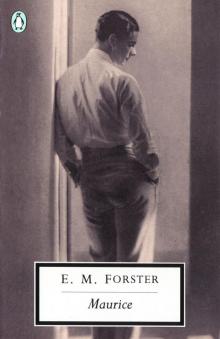 Maurice
Maurice The Longest Journey
The Longest Journey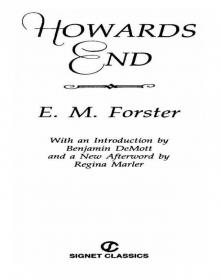 Howards End
Howards End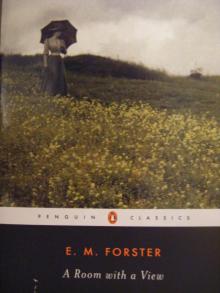 A Room with a View
A Room with a View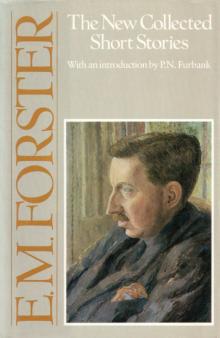 The New Collected Short Stories
The New Collected Short Stories A Passage to India
A Passage to India Where Angels Fear to Tread
Where Angels Fear to Tread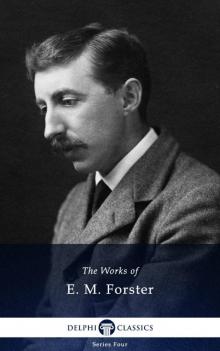 Works of E M Forster
Works of E M Forster Selected Stories
Selected Stories The Machine Stops
The Machine Stops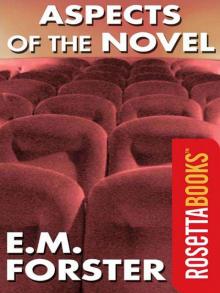 Aspects of the Novel
Aspects of the Novel